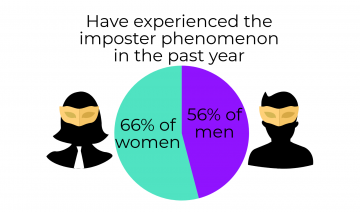We all have moments of self-doubt from time to time. But for many, their self-doubt manifests itself in the form of a cycle of doubtful feeling towards themselves. And while lack of attention to this common issue can make sufferers feel alone, there is plenty that can be done to stop the cycle.
The trademark of this emotional problem is that the person, usually someone ambitious and hard working, cannot accept their successes, and are afraid they’ll be discovered as a fraud. Despite being capable and deserving of their achievements. This issue is prominent amongst successful women such as Michelle Obama, Emma Watson, and Maya Angelou.
Imposterism is often referred to as imposter syndrome, but it is not a mental illness, and it can’t be treated with prescription medication. But that doesn’t mean that there is no hope to overcome the imposter phenomenon.
Imposterism: More common than you think:
According to a study conducted by Access Commercial Finance two thirds of women in the UK have experienced the imposter phenomenon in the past year. That is not to say men are immune. Just over half of men in the UK reported experiencing feelings or behaviours due to the imposter phenomenon. However, women are still 18% more likely to experience imposterism in their lives.

What is it like to have imposter syndrome?
Communication coach, Trisha Lewis, has dealt with the imposter phenomenon since she was a teenager. She describes a past experience at a networking event, and the feeling that although she was a success in her field, those around her would realise she was inferior to them and that she was “getting away with something”.
“Despite the fact you know your stuff, you have plenty of experience, you’re perfectly good at what you do, you walk into that space thinking they are going to look at you and think ‘Who is that non-person? Who does she think she is? She’s a bit useless, she’s pretending she knows what she’s talking about’”
This denial of one’s own successes results in thoughts and behaviours that can make life much more difficult than it needs to be. “Imposters” are often overachievers who feel if they do not maintain a high standard of work, that their co-workers, clients and peers will discover that they are not as smart, or talented, or important as they may seem. This often means those living with the imposter phenomenon burn out trying to please others and ‘hide the truth’.
“You get through a day and you feel you’ve just survived it, rather than enjoyed it or lived it. At the end of the day you feel exhausted instead of thinking ‘Hey, that was a good day, I did a good job’”
She emphasises that the imposter phenomenon can affect anyone, and part of overcoming issues with self-doubt is contact with others. Despite being a prominent emotional issue, those who suffer from the imposter phenomenon may not even know they do.
“If you work really hard at understanding it and recognising the moments when it’s happening, because it’s a feeling, but then pressing pause on the thinking prior to the behaviour, the better you get at blocking it from having negative effects. It’s not something you can cure because you can’t cure feelings, the bit you have to work on in the pause button between the feeling and the action.”
How to manage the imposter phenomenon:
Dr Terri Simpkin, a long-time researcher on the imposter phenomenon, works through her organisation Braver, Stronger, Smarter to create workshops and consult for people looking to improve their lives by living up to their potential. She became interested in the imposter phenomenon as a PhD candidate, when she was paralysed with the fear of being found out as a fraud just before she was meant to turn in her thesis. Even after 5 years of work and study to achieve this goal, she still feared her
“People ask me ‘How did you get over it?’, I tell them ‘I’m still working on it!'”
Terri suggests for those fighting against issues of self-doubt and the imposter phenomenon find someone they trust to talk to. Speaking with a mentor or coach can be beneficial as they are more able to discern emotions and thoughts in a person that are caused by the imposter phenomenon.
“A mentor can be really blunt and hold a mirror up to the measures of success the person is trying to diminish in themselves.”
What else can I do to manage the imposter phenomenon?
Lisa Fisher, a coach with Engaged Minds, suggests to her clients other personal forms of management along with mentoring or finding a coach. Positive affirmations and looking inwards to analyse one’s own personal issues can help break personal barriers. Issues with self-doubt are the most common issue she encounters in her practice, and she talks through steps with her clients to determine how much care they give to themselves.
“A lot of [my clients] have heard of these terms like ‘positive affirmations’ but they’ve just not invested that time to do it. It’s fine when you read about these things but to actually implement it is quite different.”
“We should look at ourselves, what we’re doing well, and not compare ourselves to others. I would try to dig a little bit deeper. I ask the client where they are now and where they want to get to and we put a plan in place. Changing someone’s belief system is not something you do overnight, you need to put small steps in place to help them overcome that mindset.”
Lisa stresses the importance of realising one’s own value to help overcome issues like imposterism, as self-confidence and self-belief can go a long way.
While those with imposterism may feel isolated and alone, there are many who feel the same. Like all emotional dilemmas, talking it out with someone who can help identify diminishing language and other behaviours related to the imposter phenomenon can be extremely helpful in overcoming this issue.
(Unmasking the Imposter Full Feature)
More from this article here

